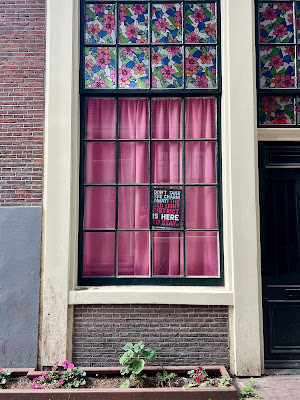At our visit to the Prostitution Information Center, we were told we would talk to two sex workers: Brenda, the ‘sex assistant’ who works by appointment with disabled men, and Lucy, who worked in the windows. To our surprise, however, out walked one 61 year-old fountain of knowledge, who switched personas based on which type of work she was doing that day. If Brenda had introduced herself to us only as Lucy, I wonder how differently the lens we listened to her through would have been. As Brenda – the sex assistant who provides intimacy and care for disabled clients – she was met with respect and, in some cases, admiration. But Lucy, in the business-like autonomy she held unrelentingly over her sexuality, was either judged far more harshly for her work or seen instead as a victim needing saving. What made the difference? Both roles are legal, consensual, and empowering. But only one aligned with gendered expectations of service, softness, and "giving back."
This tension between appearance and acceptance isn’t unique to sex work. I’ve seen it in how the Netherlands presents its queer history too. Amsterdam brands itself as the “gay capital of the world,” but that glossy image often leaves out the people who don’t fit the central casting: queer women, trans folks, migrants, and anyone outside the white, cis, gay male narrative. At the IHLIA LGBT Heritage library, I loved seeing archival records of queer history and media, but it was hard not to notice who was most visible. The feminist bookstore Savannah Bay in Utrecht exists today not only because the mainstream gay movement didn’t fully include queer women, but also because queer women were forced to create a space for themselves separate from the collective queer emancipation at the time.
Sara Ahmed writes that institutions often absorb social justice movements just enough to neutralize them (2012). That’s evident in how Dutch queer progress has often prioritized inclusion over equity. Visibility is granted to those who assimilate into existing power structures, not those who challenge them. And when gender roles are at play, the rules of acceptance are even narrower.
We see the same dynamics in sex work. The Netherlands is often applauded for its legalization and regulation of prostitution, and yes, there’s real infrastructure behind that. Sex workers register with the Chamber of Commerce, pay taxes, and even get deductibles on condoms and lubricant. But the stigma hasn’t vanished. As Brenda explained, her work as a sex assistant is praised because it’s seen as therapeutic, even maternal. But as Lucy, she’s treated with suspicion, even pity – despite the fact that role offers her more autonomy, safety, income, and control over her boundaries.
While Dutch sex work policy frames prostitution as a legitimate form of labor, it still operates within gendered and moral assumptions about who deserves respect and protection (Vanwesenbeeck, 2011). In an industry entirely catered to male desire, it’s hard to argue with that. When sex work is aligned with male pleasure and capitalist exchange, it’s tolerated but not embraced. When it’s wrapped in caretaking language, it becomes more palatable, especially when performed by women.
This divide made me think back to something Ahmed (2012) suggests: that being tolerated is not the same as being included. Tolerance creates a ceiling for how people can exist publicly, especially when their labor, their love, or their livelihood resists dominant narratives. Whether you’re a lesbian trying to write your story into the queer narrative or a sex worker trying to survive the dichotomy of misogyny and capitalism, your legibility depends on how closely you fit the script.
(n=599)
References
Ahmed, S. (2012). On being included: Racism and diversity in institutional life. Duke University Press.
Vanwesenbeeck, I. (2011). Sex workers’ rights and health: The case of The Netherlands. In B. A. Dalla, L. M. Baker, & C. R. Williamson (Eds.), Global perspectives on prostitution and sex trafficking: Europe, Latin America, North America, and Asia (pp. 55–82). Lexington Books.


I have acted with honesty and integrity in producing this work and am unaware of anyone who has not.
ReplyDelete/s/ Chandha Dhinaker